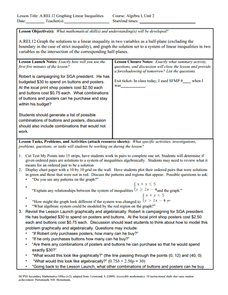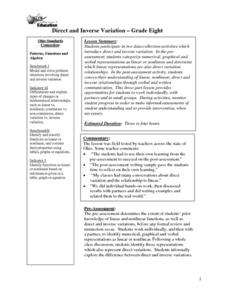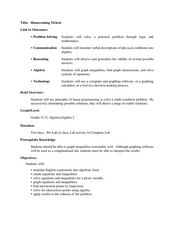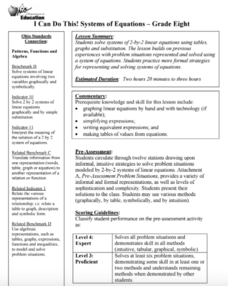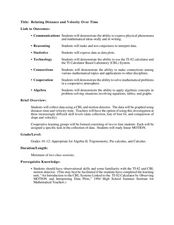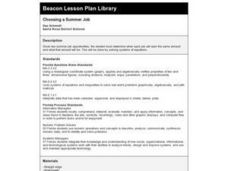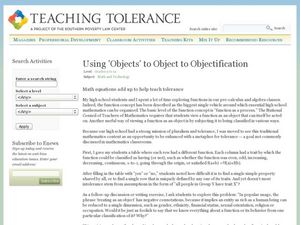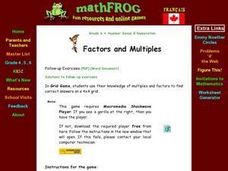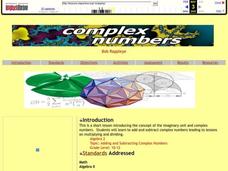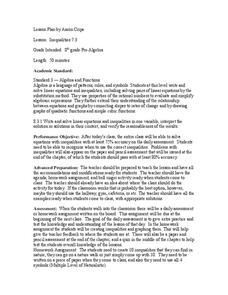Curated OER
Solving One-Step Equations
Ninth graders explore the concept of a simple equation. They use addition and subtraction in one step in order to find balance to both sides of the equation. Students are encouraged to succeed using positive praise at the beginning of...
Curated OER
Solve Me-One and Two-Step Inequalities
Students solve one and two-step inequalities. In this Algebra I lesson, students solve inequalities using paper and pencil and use the TI-nspire CAS to check each steps in their work. Additionally, the solve feature...
Curated OER
Mini-Metric Olympics
Eighth graders participate in the mini-metric Olympics. In this measurement lesson, 8th graders solve real-world problems that require them to calculate length, area, and volume in metric units.
Curated OER
Using Pattern Blocks and Fractions
The lesson plan includes scaffolding with the use of a teacher assistant and peer tutoring. The lesson has good intentions and the set up for instruction is well thought out. However, there is not enough information in this lesson to...
Curated OER
Investigating Linear Equations Using Graphing Calculator
Learners investigate linear equations using the Ti-Calculator. In this algebra lesson, students graph lines and identify the different quadrants on a coordinate plane. They identify ordered pairs used to plot lines.
Texas Instruments
NUMB3RS Activity: Narrowing the Search
Learners explore the length of an n-dimensional vector. For this Algebra II/Pre-calculus lesson, students investigate an expansion of the Pythagorean Theorem to n-dimensional space.
Curated OER
Graphing Linear Inequalities
Eighth graders extend skills for representing and solving linear equations to linear inequalities. Lesson activities build understanding and skill by plotting ordered pairs of numbers that either satisfy or do not satisfy a given...
Curated OER
Direct and Inverse Variation
Eighth graders participate in two data collection activities that involve direct and inverse variation. In the pre-assessment, 8th graders categorize numerical, graphical, and verbal representations as linear or nonlinear and determine...
Curated OER
What's My Rule? Simple Linear Functions
Middle schoolers investigate simple linear functions by trying to guess a function rule from inputs and outputs. They write the function rule in algebraic form.
Curated OER
Homecoming Tickets
Students solve word problems using systems of equation. For this algebra lesson, students use computer and graphing to graph and analyze their solution. They solve system involving inequalities.
Curated OER
Integers
Students perform order of operation using integers. In this algebra activity, students apply properties of integers as they add, subtract, multiply and divide integers. They work in groups to complete a RAFT assignment.
Ohio Department of Education
I Can Do This! Systems of Equations
Use tables, graphs, and substitution to solve systems of linear equations. An envelope of sample problems is passed around the classroom, and each learner has the opportunity to solve the system in the envelope. This is a great way to...
Curated OER
Chill Out
Students investigate Newton’s Law of Cooling. In this Algebra II/ Pre-Calculus lesson, students explore exponential regression as they conduct an experiment to simulate the temperature variations that occur as a liquid cools. ...
Curated OER
Slippery Slope
Students define patterns, relation and function. In this algebra lesson, students find the slope of a line and write equations of line. They model the slope using real life scenarios.
Curated OER
Relating Distance and Velocity Over Time
Students calculate the distance and velocity over time. In this algebra instructional activity, students graph a linear function to represent the distance vers time travel. They interpret their graphs and draw conclusion.
Curated OER
Choosing a Summer Job
What did you do over your summer vacation. Young wage earners must compare summer job options, and determine when each job earn the same amount and what that amount be. This be done by creating, graphing, and solving systems of...
Curated OER
Commutative Property
First graders use various models to learn the Commutative Property of Addition. In this Commutative Property lesson, 1st graders use other students, counters, balances, and dominoes to apply the addition property. Students solve addition...
Curated OER
Fractal Fern
Learners identify the location of coordinate pairs of an image. In this geometry lesson plan, students perform transformation and identify the image and pre-image point of location. They apply the concept of fractals to...
Curated OER
Using Objects to Object to Objectification
Students use math functions in part to complete a metaphorical lesson on tolerance. In this math and tolerance lesson, students receive rows of functions and try to find a single simple shared property without success. Students then...
Curated OER
Factors and Multiples
Sixth graders need to see the relevance in the mathematics they learn. This lesson plan builds on the concepts of least common multiple and greatest common factor. The lesson plan presents real-world problem situations for students to...
EngageNY
Solving Equations Involving Linear Transformations of the Coordinate Space
Explore methods for solving linear systems with your classes and introduce learners to using matrices as a viable method. Scholars are able to recognize situations where matrices are the efficient method of solving. Application...
Ohio Department of Education
The Solution is Complex
Consider complex numbers, roots, and quadratic equations. Use the discriminate as a way to determine the nature of a quadratic's roots. Then discuss the similarities and differences between quadratics with two, one, or no real roots....
Curated OER
Complex Numbers
Learners are introduced to the concept of imaginary unit and complex numbers. They are taught how to add and subtract complex numbers. Learners define a complex number. They comprehend at least two applications of complex numbers....
Curated OER
Inequalities 7.3
Graph inequalities and discuss the difference in their slopes. Learners observe rate of change as they compare linear, quadratic, and cubic functions.








